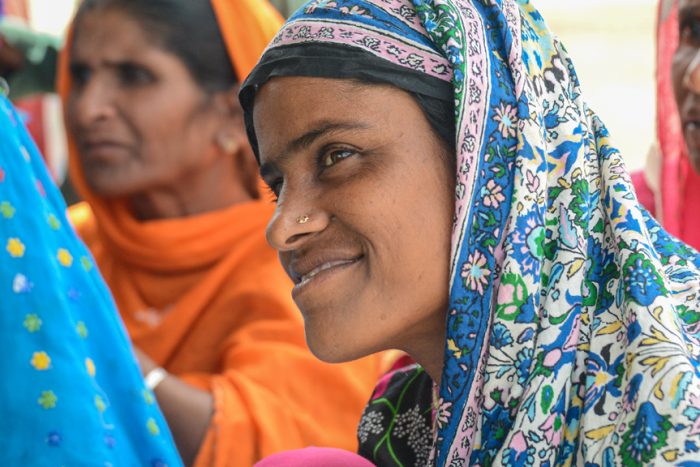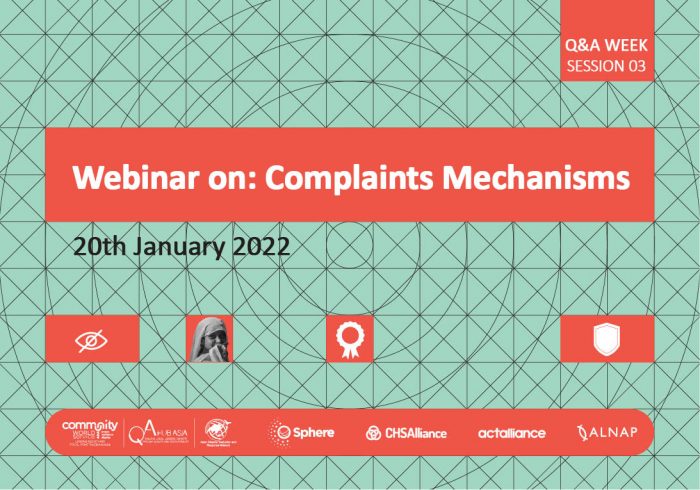As part of the Quality & Accountability Week 2021, a webinar titled ‘Key Policies & Minimum Requirements in relation to Safeguarding’, was jointly hosted and organised by ADRRN’s Quality and Accountability (Q&A) Hub, Sphere, CHS Alliance, ACT Alliance, ALNAP and Community World Service Asia (CWSA).
This webinar was the second one of the webinar series on Safeguarding and Complaints Management. Speaking about Safeguarding, Ester Dross, lead facilitator and moderator of the webinar, shared the need to explore and understand essential policies and guidance to establish a safeguarding framework, “The first session was more about general safeguarding, what it is and what it means for organisations to setup safeguarding framework. Today, we will have a concrete and practical discussion on what it means for our organisations when we speak about safeguarding and, what essential policies and guidance we need to have in place to establish a safeguarding framework.”
More than 80 humanitarian and development practitioners participated in this 90-minute webinar that discussed a wide array of diverse expertise and knowledge on safeguarding from all over the region.
Safeguarding, a key responsibility of every organisation
76% of the participants defined safeguarding as an organisation having a set of policies and procedures in place to prevent and protect different stakeholders from sexual exploitation. Abuse and harassment.
“We want to embrace the responsibility of the organisation to ensure that their staff or operations do not harm children or adults. This is really about having policies and procedures in place, from a Code of Conduct to a safe reporting and recruitment mechanism,” said Ester Dross.
While discussing key policies and guiding documents, participants identified policies that are essential for establishing and mainstreaming safeguarding. These included a Code of Conduct, a Safeguarding policy, complaint response mechanisms, HR policy, disciplinary policy, investigation guidelines and a separate safeguarding and code of conduct policy for Persons with Disabilities (PWDs).
Participants discussed and identified key components to improve the safeguarding practices. “It is critical to establish clear definitions of safeguarding and Sexual Exploitation, Abuse and Harassment (SEAH) so that everyone understands what the organisations are talking about when they discuss safeguarding. Safeguarding and other related phrases may have different definitions from one organisation to another or even from one context to another. Certain definitions, such as sexual harassment and safeguarding, must however, be streamlined and thoroughly understood across the organisation. It is also crucial to relate SEAH breaches to contracts and disciplinary actions, as well as to regulate or prohibit sexual relationships with various stakeholders.” Ester further emphasised on humanitarian organisations to ensure effective reporting of any suspicions or incidents and create a safe and SEAH free environment.
28% of the attendees selected ‘Prohibition of sexual relationship with children from a list of rules when asked to identify key behavioural rules that would need to be included in a code of conduct in terms of safeguarding.
Minimum key rules and commitments that organisations require to include in their code of conducts for safeguarding and prevention of sexual exploitation, abuse and harassment to be compliant with UN Secretary General’s bulletin and IASC Inter-Agency Standing Committee’s[1] key commitments on sexual exploitation, abuse and harassment were shared in the webinar:
 |
Sexual exploitation and abuse = Gross misconduct |
 |
Sexual activity with children (-18 years) is prohibited |
 |
Exchange of money, work, aid, services against sexual favours is prohibited |
 |
Sexual relationships between beneficiaries and staff are prohibited |
We need to have an effective, accessible, safe & non-retaliation complaints response & recruitment mechanism
Clear definitions on complaints and how to address anonymous complaints are essential to having an effective policy and systems. It is also important to emphasize on maintaining confidentiality and protection and how to deal with whistle-blowers among staff. “Clarity on key commitments such as the procedure of registering and addressing complaints, disciplinary action, appeals process and references and vetting are essential,” said Ester.
Yasir Khan, a participant at the webinar, shared his concern on reporting cases, “Individuals sometimes do not feel safe to report any suspicious case. For this reason, organisations must establish a strong complaint response mechanisms and train staff to come forward through a standardised procedure and report incident witnessed internally or in communities. In addition, proper safeguarding standards should be set within organisations, available in local languages as well, to allow individuals to clearly understand the process and report without any fear or discomfort.”

- What do we need to include into our recruitment process in terms of safeguarding?
- What do we need to include into job descriptions in terms of safeguarding?
While addressing these questions, raised by Ester during the webinar, the participants highlighted the need to include equal representation of men and women in the recruitment team and ask questions related to safeguarding during the interviews. Some shared the need to sign an undertaking focused on Safeguarding and commit to maintenance of confidentiality and diversity in recruitment.
“It is important to be precise on who should provide a reference so that one can avoid references from line managers who are your best friends. This will allow organisations to gain useful information on the person they aim to recruit. Elaborated questionnaires can be sent to references to address some specific questions that takes up more time but prove to be more helpful in recruiting the right person,” shared Ester.
Due to the increase in safeguarding issues, it has been recommended to conduct interviews with people who are providing reference checks. “This can be a good indicator to determine if the applicant being considered will be able to comply with the safeguarding policy and procedures set within the organisation.”
Speaking about inclusion of key points on safeguarding in job descriptions, participants shared, “It is important to remind people, even at the level of announcing new positions, that there is zero tolerance on SEAH. In addition, commitment to maintaining confidentiality can be added in the contracts. An individual can be given a role to act as the focal person on Safeguarding in the organisation, who will be responsible to orient staff, promote the policy and ensure proper implementation of the procedures and guidelines established.”
Another point raised was to add the commitment to maintain safeguarding norms, especially for staff with specialised responsibility or who work with vulnerable individuals. Moreover, the job description can guarantee that disciplinary action is included in the event of a breach.
Ester shared an anonymous action plan from an organisation, which contained activities to improve the organisational culture and put safeguarding at the centre of everything. “An action plan will attempt to provide a safe environment for the children, youth, and families with whom organisations engage with, as well as employees and partners.”
“Working with children and young adults may be quite gratifying. However, it also entails a significant amount of responsibility. One of the most crucial components of this responsibility is your duty to keep individuals under your care safe. Having a solid safeguarding policy in place is the ideal method to guarantee that personnel have the information and skills required to offer a service that safeguards all stakeholders involved in humanitarian work,” Ester concluded.







 Ms. Dross is an indépendant consultant with over 25 years of expérience, specializing in accountability, prevention of sexual exploitation and abuse, gender and child protection.
Ms. Dross is an indépendant consultant with over 25 years of expérience, specializing in accountability, prevention of sexual exploitation and abuse, gender and child protection.